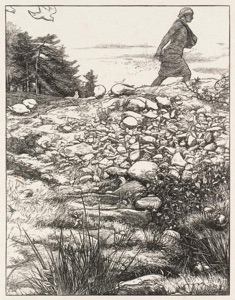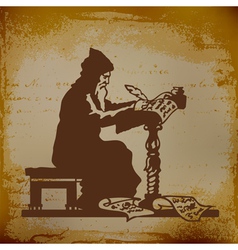The Law of Unconscious Growth—Good Soil
The Law of Unconscious Growth and that each person should culture themselves toward being good soil, delivers a powerful message within the Path of the Way.
“And the man said, “So is the kingdom of God, as if a man cast seed into the ground; And should sleep, and rise night and day, and the seed should spring and grow up, he knows not how,” Mark 4.26-27.
* In Matt. 13.1-52, Jesus also explains the nature of the kingdom (also, Mk. 4.1-32).

Avoiding the Stoney ground, Mt. 13.5.
The image of the sower is iconic.
He or she represents promise & bounty and intends benefits to the soul.
As every farmer knows, sowing is performed until the whole field has received the seed. A complete sowing is necessary for a good crop. The farmer does not mix his field with various seeds, he sows a different seed in a new field. Consistent and proper sowing is illustrated as Jesus instructs in the Parable of the Sower.
In Mark 4.26, Jesus begins by describing the kingdom, “So is the kingdom of God,” and then explains how the kingdom works: “a man cast seed into the ground,” he then waits (patience), “…and the seed should spring and grow up.” This simple process: sowing seed for the soul, and by the spirit to bring it forth, describes the formula for growth within the Teaching of the Way. For, without sowing seeds, no progress (growth) can occur. The parable also indicates that the spirit does the growing, not the farmer. Once the farmer casts his seed, for that time his job is finished.
Jesus teaches us a critical aspect of the pathway—name the seed, sow that good seed, and the spirit of God will begin to manifest within and without. “For the earth yields crops by itself: first the blade, then the head, after that the full grain of the head” (28). For example, some people sow love on their pathway. They repeatedly sow the seeds of love until it becomes a part of their soul’s nature. Others sow faith. Some sow for knowledge, for revelation on matters that concern them, or for revealment of Self. The basic process is to sow until you have entirely sown the field, then step back and allow the crop to sprout. Nor do you have to watch or worry over it every moment. It is only a matter of time, “night and day,” Jesus says, and the field will begin to sprout.* “When he put in the sickle,” the harvest is reaped. The harvest is the portion of the kingdom that enters your life, to the extent you partake.
*sprout=nazara
♦
In different areas of scripture, Jesus tells us what the kingdom is like. We see him healing, speaking, consoling, and in doing so infers an unending harvest, much as the unending kingdom itself. Jesus states that good soil is a vital part of the kingdom, which refers to each individual. Yet many have not first prepared themselves from within. They may have many questions about life or be confused or unfocused. Their field has not been cleared, nor plowed, nor the soil in any way turned up, so sowing becomes an exercise in reaching and grasping. Such a field is not ready to receive seed. In fact, throughout the whole endeavor to sow good seeds, many people may represent the rocky ground themselves (v. 16).
Further, lack of preparation within self is one reason people pray and pray but get no results. The prayer cannot be delivered. Remember, walking in the Way is the spiritual pathway Jesus taught. Such a pathway will always require some preparation before the journey is undertaken. In the extended message, Jesus tells us to prepare ourselves to receive, much as the farmer does.
Receiving may require an inspection of ourselves, and our actual character, instead of presuming ourselves to be now qualified to ‘work the magick’ of sowing good seed and expecting results. A seed of humility might be needed before other tasks are undertaken, for instance. Remember that you are the field and that almost all people have assumed worldly teachings that may be false or improper for you. Sow seeds that the workers should clear the field and that the workers should plow the field. Seed yields best in prepared ground.
Are you a person who is good at giving but not so good at receiving? Are you good at receiving in the physical world, but not so much in the spiritual? Have you sown to be a receiver of God’s blessing? Have you reflected upon the kingdom you are about to enter? Many do not. Mark 11.24 gives us a recipe for our heart’s desires: “…whatever things you ask (desire) when you pray, believe that you receive them, and you will have them.” The broader notion is given in Psalm 51.6: “Behold, thou desirest truth in the inward parts: and in the hidden part thou will make me to know wisdom.”
 The inward or hidden parts are really where unconscious growth begins. Therefore, relative to naming, sowing, praying, or speaking the Word, personal reflection is required. Begin with yourself. With review, a more mature sowing develops. When a person begins to look at elements concerning character (board in your eye), this in itself becomes the plowing. Sowing seeds into fundamental elements of character or performance will always yield a firm foundation. Spiritual development is never in a hurry—first the clearing, then the plow, then the seed, then the growth, then the harvest.
The inward or hidden parts are really where unconscious growth begins. Therefore, relative to naming, sowing, praying, or speaking the Word, personal reflection is required. Begin with yourself. With review, a more mature sowing develops. When a person begins to look at elements concerning character (board in your eye), this in itself becomes the plowing. Sowing seeds into fundamental elements of character or performance will always yield a firm foundation. Spiritual development is never in a hurry—first the clearing, then the plow, then the seed, then the growth, then the harvest.
Recall how the ‘order to events’ is mentioned in many lessons throughout this work. Here we have one of the primary uses for understanding the discipline of proper order. There are as many variations on how to sow seed as there are people, but principles will always apply. Within these principles, the teaching itself and walking on (experiencing) the pathway unite. This unity becomes a powerful force within the person and his or her daily life.
 You are the soil where the crop will grow. Sowing seeds for the revealment of self is helpful. Prepare yourself properly. As many have stated, if you seek a spouse, make sure your clothes are pressed.
You are the soil where the crop will grow. Sowing seeds for the revealment of self is helpful. Prepare yourself properly. As many have stated, if you seek a spouse, make sure your clothes are pressed.
Sowing into your pathway is a simple concept, but how few are dedicated enough to practice? Fewer still realize that the reaping is primarily directed toward the kingdom and most directly applies to you as a soul, not solely as a form of acquisition (See, Seth & Enosh). It is intended that the spirit within will be the first notice of manifestation.
When you sow good seed the spirit brings forth the crop from within (unconscious growth). Harvest is neigh. That is your signal to become an active participant (receiving) in the kingdom of God!
♦
Just as on earth, Jesus reveals the mysteries of growth within the kingdom. “The sower sows the word,” Jesus tells us in Mark 4.14. Jesus speaks of spreading the word of the kingdom of God, yet  suggests that the board in your eye is the biggest obstruction. We stop ourselves, as some have put it. Soon after, Mark 4.20: “But these are the ones sown on good ground, those who hear the word, accept it, and bear fruit: some thirtyfold, some sixty, and some a hundred.” The good ground is intended to describe yourself, one who has received both the seed, the growth, and the harvest. The good seed, the good word, and accepting the seed are open to those who wish to participate in the new kingdom of consciousness.
suggests that the board in your eye is the biggest obstruction. We stop ourselves, as some have put it. Soon after, Mark 4.20: “But these are the ones sown on good ground, those who hear the word, accept it, and bear fruit: some thirtyfold, some sixty, and some a hundred.” The good ground is intended to describe yourself, one who has received both the seed, the growth, and the harvest. The good seed, the good word, and accepting the seed are open to those who wish to participate in the new kingdom of consciousness.
Remember that the seed has to sacrifice itself to become the sprout. Some current personal attributions will have to be sacrificed, not just changed, but given up in whole for the greater soul growth. Other attributions may be of good intent but are misdirected or not full enough to yield a crop.
 For the above lesson let us revisit Cain. Cain insists that God honors his labor and how he performs his labor. Cain’s attribution to himself and his ways is obvious. He sees God’s apparent lack of blessing as unfair but never seeks a greater understanding as to why this might be. The hard-scrabble crop he offers is much like he perceives God’s inattention, perhaps carelessly, haphazardly, thoughtless within the vanity of his struggle. He cannot see the seed of self, but can clearly perceive the outcomes of lack. For all his labor, Cain sacrifices nothing within himself. He replants the same seed in the same stony ground. His attribution is only toward different results, but the hard shell of his seed does not sprout, except to difficulty and greater consternation. He changes not but perceives Abel, he who is favored, as the gig in his side.
For the above lesson let us revisit Cain. Cain insists that God honors his labor and how he performs his labor. Cain’s attribution to himself and his ways is obvious. He sees God’s apparent lack of blessing as unfair but never seeks a greater understanding as to why this might be. The hard-scrabble crop he offers is much like he perceives God’s inattention, perhaps carelessly, haphazardly, thoughtless within the vanity of his struggle. He cannot see the seed of self, but can clearly perceive the outcomes of lack. For all his labor, Cain sacrifices nothing within himself. He replants the same seed in the same stony ground. His attribution is only toward different results, but the hard shell of his seed does not sprout, except to difficulty and greater consternation. He changes not but perceives Abel, he who is favored, as the gig in his side.
Once the seed is sown the growth begins, whether or not you are sensitive to this growth. The seed grows night and day. Since the kingdom of God is within you, the good seed you sow will always manifest within before it manifests without. You become the first signpost for what is coming. Essentially, sowing the good seed is like an instruction manual. You have to follow the directions. The study of the parables concerning the Sower, including the accompanying scriptures describing the kingdom, delve deeper than at first glance and require some effort in gaining every nuance.
Heaven, the kingdom, is essentially brought down to earth by you naming the good word, consistently sowing and looking to the fields as if already white with harvest (Jn. 4.35), and then receiving or reaping the harvest as it fully abounds. You essentially name your pathway after that which is righteous, a ‘kingdom pathway’ if you will. You give up what holds you back—God honors fresh sowing. That which held you back is transposed into the new harvest and becomes a part of the heavenly blessing as you walk your path.
The signs begin slowly. First, the blade, or the indication that growth begins; next, the early sign that a mature crop is in the process of growth, the formation of the ear; finally, the fruit begins to show, and once mature the harvest is taken in. A further awakening occurs as the harvest is accepted or received. Thus, learning to receive is of great importance in the teaching of the Way. Asking is not the same as receiving. The harvest may be before you, but many cannot see to harvest. Steady and consistent, the above method of working truly offers keys to the kingdom Jesus describes.
Some think they are not worthy. When the scribes and Pharisees brought to Jesus the woman caught in adultery, he demonstrated mercy and saved the woman from being stoned (Jn. 8.3). He pronounced her worthy in the eyes of God. Jesus held her up to God, showing mercy, protecting her, and naming good seed into her. What seed did Jesus leave her with? “Go,” he said, “and sin no more.” Likewise, do not diminish yourself, even amid sin or great difficulties but follow the instructions to plant good seeds, seek God through prayer, and at times, when necessary, be willing to speak the spirit into the circumstance, known as speaking the Word.
*
As you plant the good seeds, you will discover a contrast between positive and negative thinking, constructive actions and speech, and destructive ones. Once the planting has sprouted and grown strong, you will begin to see the weeds. In the Parable of the Weeds, also known as the ‘Wheat and the Tares’, Matt. 13.24-30, Jesus explains that a man sowed good seed into his field, yet others came during the night to sow weeds. The owner tells his servant to let both grow until the difference becomes apparent. The roots of the wheat will be strong enough that pulling up the weeds can then be accomplished. Sowing to the positive is one lesson here.
Jesus clarifies that the spirit of God should become more pronounced within daily life. Negative thinking, doubt, and despair will show themselves due to what you have already sown, which is the growth of weeds. Yet this contrast between wheat and weeds allows a person to be watchful. It becomes much easier to move the soul nature, as the weeds can be pulled from the mind. Get your servants to work in the field to bring forth a clean crop.
As Jesus teaches, stick with the vision of the field ripening toward harvest, and stay on a positive course. The spirit nourishes your planted seed, just as it does the planted seed of the farmer, and allows the crop to grow within you. In both cases, the growth is spontaneous, both in the physical and the spiritual world, even though we may not be completely aware of how the spirit accomplishes this growth. Thought building upon itself might be one way to explain this growth. The Parable of Unconscious Growth in Mark 4:26 illustrates this mystery very well.

God Bless!
Hello! I could have sworn I’ve been to this blog before but after browsing through some of the post I realized it’s new to me. Anyways, I’m definitely happy I found it and I’ll be book-marking and checking back frequently!
I think this is one of the most vital info for me. And i’m glad reading your article. But should remark on few general things, The site style is ideal, the articles is really great : D. Good job, cheers